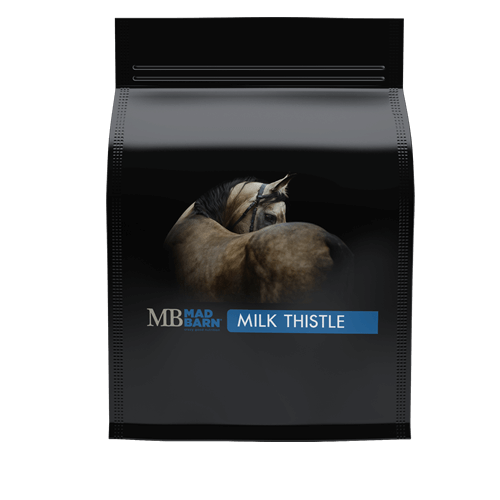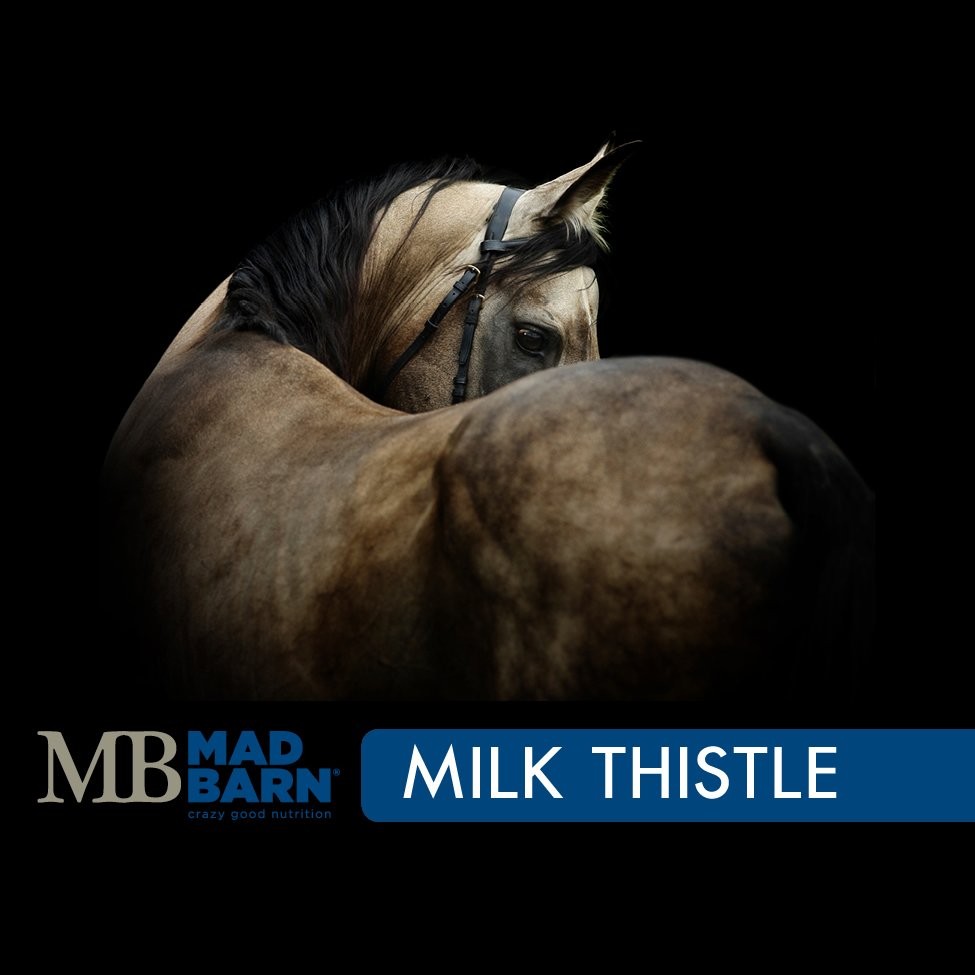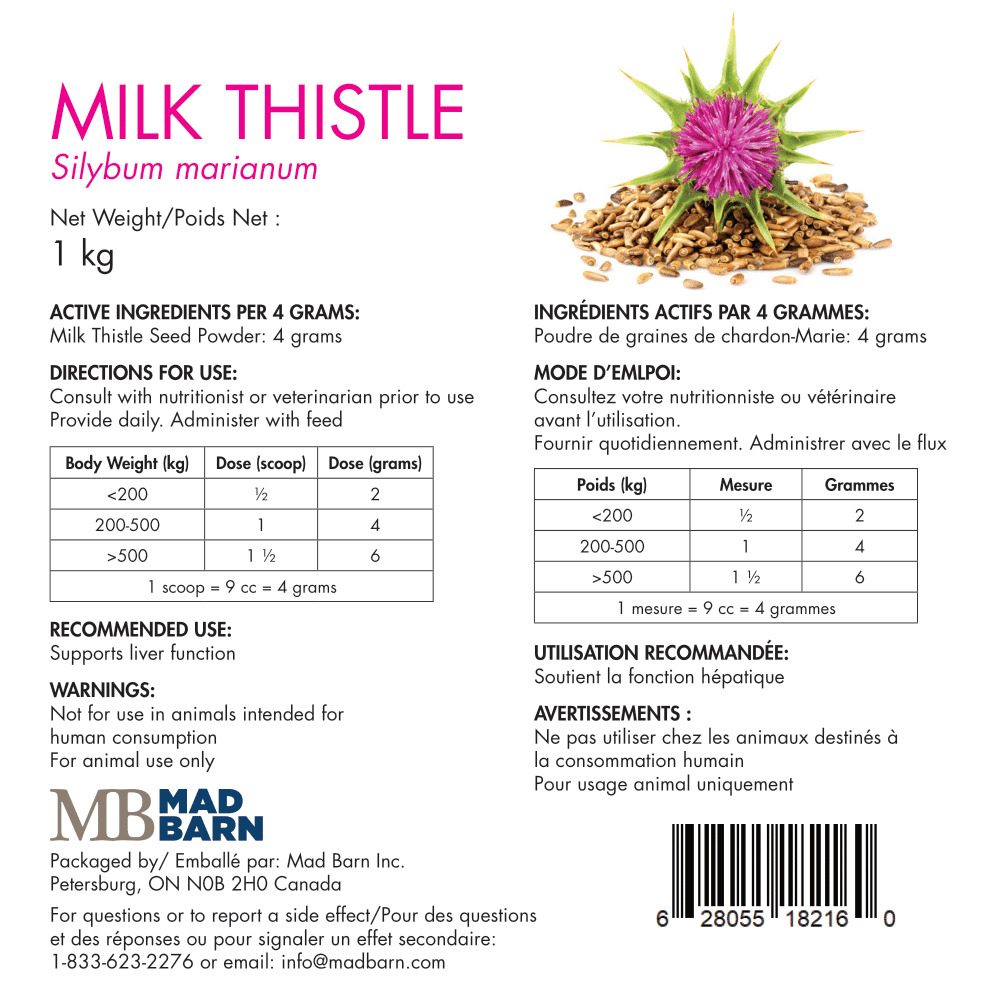MADBARN
MADBARN- MILK THISTLE FP
Couldn't load pickup availability
Milk Thistle extract has potent anti-oxidant and anti-inflammatory effects for horses. It can protect the liver from toxins, iron overload, and from the negative effects of fatty liver. It might help to support liver function and detoxification. Milk thistle supplementation may be beneficial for horses with allergies and other issues related to inflammation. It could provide nutritional support to horses that are prone to laminitis.
Mad Barn’s Milk Thistle extract is a dried, powdered form of the fruit and seed of the Silybum marianum plant. This herb can be added to equine diets to support liver and hoof health and protect against free radical damage.
Milk Thistle, also known as St. Mary’s Thistle, is a Mediterranean plant that contains various active compounds collectively called silymarin which include silybin. The main site of action of milk thistle extract is the liver and it has been well-researched for its effects on liver disease in humans. [1]
Silymarin is an effective anti-oxidant that is thought to protect the liver from injury related to toxins, fat accumulation, and iron overload. Horses that are prone to liver issues might benefit from milk thistle supplementation to help detox the liver and support its function.
Milk thistle has been shown to protect the liver from toxins in the environment, like those found in poisonous mushrooms. Liver damage might occur in horses if they consume poisonous plants like ragwort or red maple trees. If these are prevalent in your area, consider adding milk thistle to your horse’s diet.
Easy keepers that tend to have cresty neck and other abnormal fat deposits might have excess fat in the liver. Overweight/obese horses and those with equine metabolic syndrome or Cushing’s disease/PPID might benefit from milk thistle supplementation to help protect their liver and support its function. In humans, silymarin has been shown to protect against the negative effects of fat accumulation in the liver. [2]
Milk thistle could provide nutritional support for horses with laminitis. Laminitis is partly caused by toxins that create inflammatory responses in the hoof. The anti-inflammatory properties of milk thistle have been shown to protect the tissues of the hoof from toxins.
In one study, tissue extracted from horse hooves was challenged with toxins and treated with milk thistle or silymarin. The protocol was able to neutralize the toxin and improve the structural integrity of the tissue. [3] Further research is needed to verify these effects in horses consuming oral milk thistle supplements.
This herb might help horses that are prone to seasonal allergies like heaves, due to its anti-inflammatory properties. It might also have benefits for horses affected by allergic reactions to Culcoides, also known as “sweet itch”.
If you suspect your horse has high exposure to iron in their feed or water, you may want to consider supplementing their diet with milk thistle. In humans that are genetically prone to iron overload, this herb has been shown to decrease iron absorption.
Silymarin also acts as an iron chelator, meaning it binds iron molecules and may help reduce serum ferritin levels and iron stores in tissues. [4]
Milk thistle is often used to increase breast milk production in women by increasing prolactin levels. [5] It is unclear whether it safe to use this product in lactating mares. Consult your veterinarian if you are considering using milk thistle to increase milk production in mares.
To include Mad Barn’s milk thistle extract in your horse’s diet, we suggest a dosage of 4.5 grams per 500 kg of bodyweight per day. You may want to start feeding a smaller amount and increase gradually over several weeks to minimize avoidance and improve tolerability. It can be provided as dried powder added directly to the feed or brewed into a tea that is poured over the feed.
Milk Thistle is generally well tolerated in horses. It has not been studied in breeding or pregnant horses so its safety in these animals can not be assured.
In humans it has been shown to cause diarrhea and other gastrointestinal upsets in a minority of people. In healthy horses, concentrated milk thistle extract in the form of silibinin phospholipid resulted in no adverse effects when given at a dose of up to 52 mg per kg of bodyweight (26 grams for a 500 kg horse) for one week on four separate occasions. [6]
REFERENCES
- Mulrow, C., et al. Milk Thistle: Effects on Liver Disease and Cirrhosis and Clinical Adverse Effects: Summary . AHRQ Evidence Report Summaries. 2000.
- Cacciapuoti, Fulvio et al. Silymarin in non alcoholic fatty liver disease . World J Hepatol. 2013.
- Reisinger, Nicole et al. Milk Thistle Extract and Silymarin Inhibit Lipopolysaccharide Induced Lamellar Separation of Hoof Explants in Vitro. Toxins. 2014.
- Hutchinson, Carol et al. The iron-chelating potential of silybin in patients with hereditary haemochromatosis. Eur J Clin Nutr. 2012.
- Milk Thistle . Drugs and Lactation Database. 2020.
- Hackett, Eileen S. et al. Pharmacokinetics and safety of silibinin in horses . Am J Vet Res. 2013.






